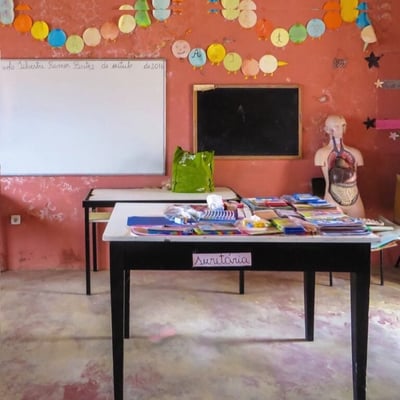1
00:00:03,176 –> 00:00:06,746
Pai: Maria, ajuda-me a pôr a mesa para o almoço.
{{Father: Maria, help me set the table for lunch.}}
2
00:00:07,246 –> 00:00:10,296
Maria: Está bem, pai. Ponho quantos pratos?
{{Maria: Okay, father. How many dishes do I set?}}
3
00:00:10,646 –> 00:00:15,706
Pai: Põe para nós, para o teu irmão, para a tua mãe e para os teus tios.
{{Father: Set some for us, your brother, your mother and your aunt and uncle.}}
4
00:00:16,046 –> 00:00:17,506
Maria: Somos seis, então.
{{Maria: We are six then.}}
5
00:00:17,816 –> 00:00:20,656
Pai: Sim. Põe os pratos de sopa também.
{{Father: Yes. Set the soup dishes too.}}
6
00:00:21,126 –> 00:00:22,876
Maria: Ugh, sopa?
{{Maria: Ugh, soup?}}
7
00:00:23,246 –> 00:00:26,436
Pai: Sim, Maria. Não penses que escapas!
{{Father: Yes, Maria. Don’t think you can escape!}}
8
00:00:26,836 –> 00:00:29,526
Maria: Que chatice! Não me apetece nada…
{{Maria: That sucks! I don’t feel like it at all…}}
9
00:00:29,866 –> 00:00:32,566
Pai: Maria, pões a mesa, se faz favor?
{{Father: Maria, will you set the table, please?}}
10
00:00:33,016 –> 00:00:36,356
Maria: Sim! Pomos aqueles copos que a mãe gosta?
{{Maria: Yes! Do we put out those glasses that mother likes?}}
11
00:00:36,576 –> 00:00:37,686
Pai: Achas boa ideia?
{{Father: Do you think it’s a good idea?}}
12
00:00:38,076 –> 00:00:40,916
Maria: Isto não é uma ocasião especial, pois não?
{{Maria: This is not a special occasion, is it?}}
13
00:00:41,346 –> 00:00:42,386
Pai: Nem por isso.
{{Father: Not really.}}
14
00:00:42,726 –> 00:00:46,936
Maria: Tens razão. É melhor não… ela ainda fica chateada.
{{Maria: You’re right. Better not… She’ll get upset.}}
15
00:00:47,276 –> 00:00:49,586
Pai: E nós não queremos isso, pois não?
{{Father: And we don’t want that, do we?}}
16
00:00:49,916 –> 00:00:51,386
Maria: Não queremos mesmo!
{{Maria: We really don’t!}}
17
00:00:51,766 –> 00:00:54,266
Pai: Põe os guardanapos, que eu ponho os talheres.
{{Father: You set the napkins, I’ll set the cutlery.}}
18
00:00:54,826 –> 00:00:57,496
Maria: Ok. Ponho já os de sobremesa?
{{Maria: Ok. Do I set the dessert ones already?}}
19
00:00:58,016 –> 00:01:04,276
Pai: Não, esses não pomos. A tua tia está de dieta, não há sobremesa para ninguém.
{{Father: No, we won’t set those. Your aunt is on a diet, there is no dessert for anyone.}}
20
00:01:04,736 –> 00:01:06,266
Maria: Estás a brincar?!
{{Maria: Are you kidding [me]?!}}
21
00:01:06,526 –> 00:01:08,826
Pai: Não. Estou a falar a sério.
{{Father: No. I am serious.}}
22
00:01:09,336 –> 00:01:13,276
Maria: Tenho de comer sopa e, ainda por cima, não há sobremesa!
{{Maria: I have to eat soup and, on top of that, there is no dessert!}}
23
00:01:13,776 –> 00:01:15,996
Pai: Não comeces outra vez!
{{Father: Don’t start again!}}
24
00:01:16,446 –> 00:01:18,286
Maria: Já estou a odiar este almoço!
{{Maria: I’m already hating this lunch!}}
25
00:01:18,636 –> 00:01:19,336
Pai: Maria…
{{Father: Maria…}}
26
00:01:19,666 –> 00:01:20,686
Maria: Já está tudo?
{{Maria: Is that all?}}
27
00:01:21,086 –> 00:01:27,226
Pai: Sim. A tua mãe e o teu irmão estão a chegar. Eles agora põem as entradas…
{{Father: Yes. Your mother and your brother are arriving. They’ll set out the starters…}}
28
00:01:27,646 –> 00:01:30,916
Maria: Ótimo! Posso ver televisão até os tios chegarem?
{{Maria: Great! Can I watch TV until my aunt and uncle arrive?}}
29
00:01:31,276 –> 00:01:33,786
Pai: Vai lá… obrigado pela ajuda!
{{Father: Go ahead… thanks for the help!}}
30
00:01:34,076 –> 00:01:36,076
Maria: Ficas a dever-me uma sobremesa!
{{Maria: You owe me a dessert!}}
31
00:01:36,366 –> 00:01:37,376
Pai: Maria…
{{Father: Maria…}}
 We respect your privacy and have a ZERO TOLERANCE for spam.
We respect your privacy and have a ZERO TOLERANCE for spam.
















Loved it!
Hi,
I am curious about the use of ‘pôr’ both for ‘to put’ and ‘to set’, as used above.
(1) If I wanted to say (a) “Put the plates on the table.” or (b) “Put the suitcase on the floor”, would I use pôr or colocar?
(a) Is it: “Coloque os pratos na mesa.” or “Ponha os pratos na mesa.”?
(b) Is it: “Coloque a mala no chão.” or “Ponha a mala no chão.”?
(2) In either case, do I need to say: “em cima da mesa” or “em cima do chão” ?
Many thanks
Declan
🙂
Olá, Declan. This is one of those answers that might not give you that much clarity, but…
(1) You can use both! No need to stick to only one option. We tend to go for “pôr” more often, simply because it’s short and straight to the point. “Coloque” doesn’t add anything in terms of meaning or formality (conjugating either verb with ‘você’ already makes it formal enough) 🙂
(2) You can say it, but you never need to say it – not with tables or the floor, at least. With other nouns, it depends. For example, something that is “no carro” is in the car. If you want to put something on the car, it has to be “em cima do carro“.
Hi Joseph,
Many thanks. That is very helpful.
Best wishes
Declan
🙂
The translation mentions uncles but there is an Aunt on a diet. I guess Tios means Uncle and Aunt but how do you know that? It is not clear unless you say Tia and Tio.
Tios can refer to a group that is all uncles, or a mixture of aunts and uncles. This is a general pattern you’ll come across, where the masculine version of a word is used as the default general term for mixed-gender groups (even if there is only 1 male!). It’s the same with words like pais and eles. An exception would be grandparents, which translates to the feminine form: avós instead of the masculine form: avôs. I’ll edit the transcript to make this clear since it currently only says uncles. You wouldn’t know for sure without further context. (In this case, since the context is a family talking to one another, they would know who is being referred to, but as the reader it would be unclear.) Thanks for pointing this out!
Great dialogue. Lots of useful phrases in addition to the verb practice.
Achar vs. Pensar. An earlier article stated that pensar is used to think about something whereas achar is used to describe a belief or conviction.
In this very informative diálogo there is Pai: “Sim Maria não penses que escapas” and a bit later Pai: “Achas boa ideia”.
I am wondering why pensar is not used in both these cases.
Olá, Patrick. “Achar” and “pensar” often overlap in terms of use, and in fact, both verbs could be used in both sentences. Just note that sometimes, changing the verb requires some adjustments to the sentence, depending on how it’s initially phrased. For example, “Achas boa ideia?” is correct, but “Pensas boa ideia?” isn’t. We have to say “Pensas que é boa ideia?” for the sentence to be complete.
Olá !
Nestas frases seguidas, porque é que há as duas formas do imperativo (tu) quando as 2 frases são afirmativas ?
1. Maria, pões a mesa.
2. Põe os guardanapos.
Obrigada pela ajuda !
Olá, Amanda 🙂 Na verdade, “pões a mesa” não está no imperativo, mas sim no presente do indicativo. Repara que não é uma ordem ou pedido direto, mas sim uma pergunta indireta. Apenas a segunda frase que indicaste (põe os guardanapos) está no imperativo, porque o pedido é feito de forma direta.
Brilliant dialogue. Realistic with useful phrases to use in many situations. Thanks!
Ola !
I’xm wondering about the use of “Ainda” in the phrase “É melhor não… ela ainda fica chateada.” Could you also say “… no caso de ela fica chateada” ? That seems more straightforward but “ainda fica” could be a useful colloquialism ?
Obrigado –
Peter
Olá! Yes, this is an idiomatic and very common use of “ainda”, to express that she might get angry. “No caso de ela ficar chateada” (note: you must use the infinitive) is an acceptable alternative. Personally, if I wanted to say it differently, I think something like “ela pode ficar chateada” would be even more straightforward 🙂
Why is here the genetiv de? Often seen de when I would use the english in or on?
Olá. Prepositions in Portuguese are often tricky to learn, because each preposition can be translated in multiple ways in English, because they have a variety of uses. When it comes to the preposition ‘de’ specifically, this Learning Note should help you understand how we can use it: The Preposition “De” . It often translates as “of” in English, but it can also mean “on” or “from”, for example.
Hello team,
Many many thanks for your great work!
This is unclear to me: When do I use ‚demasiado‘ and when ‚demais‘?
Thanks in advance!
Olá! Muito obrigado 🙂
“Demasiado” is used before the concerned word and “demais” is used after:
– É demasiado tarde. (It’s too late)
– É tarde demais. (It’s too late)
Both sound natural and are very commonly used in European Portuguese nowadays, and you can choose what to use according to personal preference. In Brazilian Portuguese, ‘demasiado’ is rare.
Your speakers clearly distinguish the pronunciation põe versus põem, the latter having two rather clear syllables with a Y sound in between. However, when I hear this on other websites or translation programs, the distinction is much more subtle, and the two sound nearly identical……which is more realistic?
I would say that both are possible, but the clearly distinct ‘põem’ is perhaps the most common way to pronounce it in Portugal. In Brazil, the usual would be for the two words to sound quite similar.
Podia explicar a significa da frase ” Põem as entradas ” Não posso encontrar essa frase nenhures
Neste contexto, ‘entradas’ significa starters/appetizers/entrées. A frase completa diz que a mãe e o irmão vão colocar estas entradas na mesa.
in the sentence “Poe os parts de sopa também” why does the dad not say Poes?
Good question! “(Tu) pões…” would be the simple present, in the indicative mood. But since the dad is giving a direct command, he is actually using the imperative mood. “Põe” is the second-person singular form of the imperative.